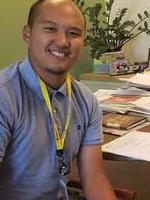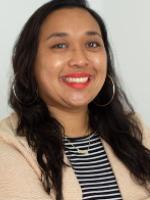

Inspire Learning With Student-Created Science Documentaries |
Explore and create : Creation lab
Merek Chang Angelica Valerio
Engage your students in authentic ways to demonstrate their science communication skills with student-created documentaries with KQED’s Science Documentary Youth Media Challenge. You will get hands-on with video production, investigate customizable curriculum and talk implementation with other teachers.
| Audience: | Curriculum/district specialists, Library media specialists, Teachers |
| Skill level: | Beginner |
| Attendee devices: | Devices required |
| Attendee device specification: | Laptop: Chromebook, Mac, PC |
| Topic: | Project-, problem- & challenge-based learning |
| Grade level: | 6-12 |
| Subject area: | Science, STEM/STEAM |
| ISTE Standards: | For Educators: Learner
Creative Communicator
|
| Disclosure: | The submitter of this session has been supported by a company whose product is being included in the session |
| Related exhibitors: | WeVideo, Inc. |
STEAM teachers are looking for new ways to engage students in the practices that will help prepare them for the demands of college, community impact and career. This session will explore the Science Documentary Youth Media Challenge, a project-based unit for middle and high school students to produce and share short videos on any science topic, observation or issue that affects them or their community.
This project includes modifiable teacher curriculum to guide students through the process of identifying, researching and creating a short video on their chosen topic, as well as publishing their video on KQED’s youth media showcase.
We base our pedagogy on the “Learn by Doing” model and participants of this hands-on session will learn the steps of video production and start their own science documentary as a model to share with students. Participants will also explore curriculum resources and hear from an educator who has done the Science Documentary challenge with students in order to think more critically about the implementation process in their own classrooms.
1. Meet the presenters and connect to fellow participants through shared experiences of their favorite science documentaries (5 minutes)
2. Science Documentary Youth Media Challenge Overview (10 minutes)
3. Analyze example student-created science documentaries (15 minutes)
Pair-share: What are the strengths of this example? What video elements made this documentary compelling?
4.Video Production Workshop (40 minutes)
-Overview of the production process (pre-production, production, post-production)
-Overview of video production online tools (we will focus on WeVideo)
-Work time: topic selection, scripting, storyboarding
5.Plan for Classroom Implementation (15 minutes)
6.Closing (5 minutes)
*Please note: This session can be modified to fit a 60-minute format.
Karahan, E., Canbazoglu-Bilici, S., & Unal, A. (2015). Integration of media design processes in science, technology, engineering, and mathematics (STEM) education. Eurasian Journal of Educational Research, 60, 221-240 Doi: 10.14689/ejer.2015.60.15
Garcia, A. et al (2014) Teaching in the Connected Learning Classroom. Irvine, California: Digital Media and Learning Research Hub.
Jenkins, H., et al. (2009). Confronting the Challenges of Participatory Culture: Media Education for the 21st century. Cambridge, Massachusetts: The MIT Press.
Ito M. et al (2019). Hanging Out, Messing Around, And Geeking Out, Tenth Anniversary edition: Kids Living and Learning with New Media. Cambridge, Massachusetts: The MIT Press.
Ito, M., et al. (2013). Connected Learning. Irvine, California: Digital Media and Learning Research Hub.
Vander Ark, Todd and Schneider, Carri. Deeper Learning for Every Student Every Day. A report from the William and Flora Hewlett Foundation.

Merek Chang is a chemistry and engineering teacher who currently teaches at Workman High School in Industry, California. He received his B.S from UC Davis in Food Science and Technology and worked full time in the food industry prior to entering education. It is his desire to incorporate media literacy and technology in to his lesson plans whenever applicable and, if possible, through the lens of food.

Angel Valerio is KQED’s program manager for STEM education professional learning and a secondary science field supervisor for Mills College’s teacher education program. She leads professional development workshops with the focus on incorporating media literacy in science instruction and is an instructor and course developer for KQED’s Media Academy for Educators. Angel has presented workshops on media production in science at the California STEAM Symposium, CUE and to various school districts in California. Previous to her current roles, Angel worked in South Los Angeles and East Oakland as a high school life science educator, teacher leader, and instructional coach.